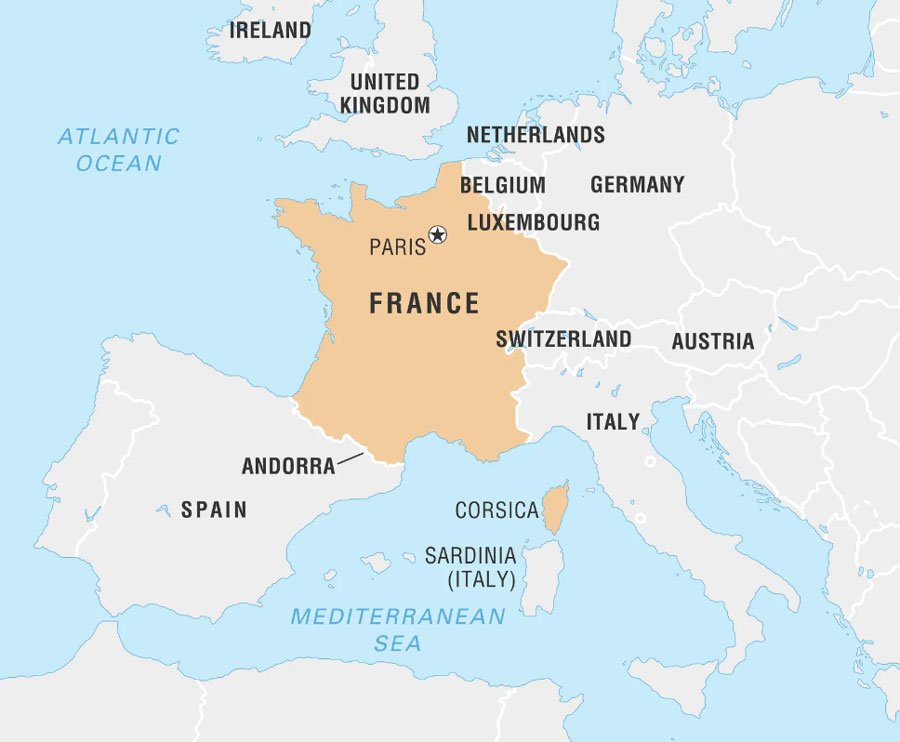
Five Quick Points About France
- The world’s 7th largest study destination for foreign students
- Incredible diversity of higher education institutions as well as programmes – something for everyone
- High-quality, well-recognised degrees
- Amazingly rich, historic, and vibrant culture – a main reason France is among the top three global tourist destinations
- Many French institutions have added international elements to their courses, including a wide variety of programmes that are taught in English
Location and Geography

France is the largest nation in Western Europe, with a total area of 674,843 square kilometres. It is surrounded by Belgium and Luxembourg, Spain, Germany, Switzerland, Italy, and by water bodies the Bay of Biscay, the English Channel, and the Mediterranean.
France is a land of flat plains or gently rolling hills in the north and west, forests and mountainous areas in the Pyrénées (south), Alps (east), and lower Vosges mountains (north east). The capital city is Paris. Mainland France has cool winters and mild summers, with the occasional Mistral wind. The Mediterranean coast has mild winters and hot summers.
Economy of France
France’s economy is the sixth-largest in the world and France is a member of the G8 and G20 groups of leading industrialised countries. It is overall a free market economy; still, the government continues to play a significant role in some areas, particularly with regard to infrastructural industries. It has a mixed industrial and agricultural export-oriented economy, and is also prioritising its knowledge economy. France has an international reputation for excellence in the fields of space, transportation, sciences, biotechnology, health, and electronics, which many people attribute to its excellent higher education system.
The currency is the Euro.
Living Conditions and Cost of Living
Students can live reasonably well on around €1,000 a month (other than Paris, which is more like €1,200–€1,800), depending on location and lifestyle. Tuition fees vary considerably €190–€620 per year at public universities and from €1,500 to €20,000 a year at private universities. The average cost of health insurance is around €40–€50 per month.
Education System
France spends more per capita on education than many other Western countries and has traditionally had high academic standards.
There are more than 400 institutions of higher education and research in four different types: universitaires (universities); grandes écoles; écoles spécialisées, and sections de techniciens supérieurs. Grandes écoles and écoles spécialisées or supérieurs are considered to offer higher quality learning environments than the universitaires.
France’s 83 public universitaires offer degree programmes in all disciplines and are spread throughout the country. There are three levels of degree: licence (three years), master’s (five years) and doctorate (eight years). Degrees can be academic, technical, or professional. To be considered for admission, international students need to demonstrate they have the credentials that would allow them to undertake higher education in their home countries.
Grandes écoles can be public or private, and they are a unique French invention. They are very selective in their admissions, much more so than the universitaires, and most specialise in business and engineering programmes. Others have reputations for public administration, teaching and research, veterinary medicine, and military sciences, to name a few. The grandes écoles have admission procedures and guidelines for international students as well as for French students.
Information Specific to International Students
France had 365,000 international students studying in its higher education system in 2021, making it the world’s seventh most popular study destination. The French higher education system is very accessible to international students; please see this link for France’s welcoming policies regarding foreign students.
Prospective international students should check current visa requirements at the French embassy or consulate in their home country.
Regarding work allowances for international students, Campus France reports:
“All international students have the right to work while studying in France as long as they are registered in an institution that participates in the national student health-care plan (and they have a resident permit if not a EU national). The right to work applies to all students, including students who come to France for the first time, registered in the first year of a university program, or registered full-time in a language school.”
